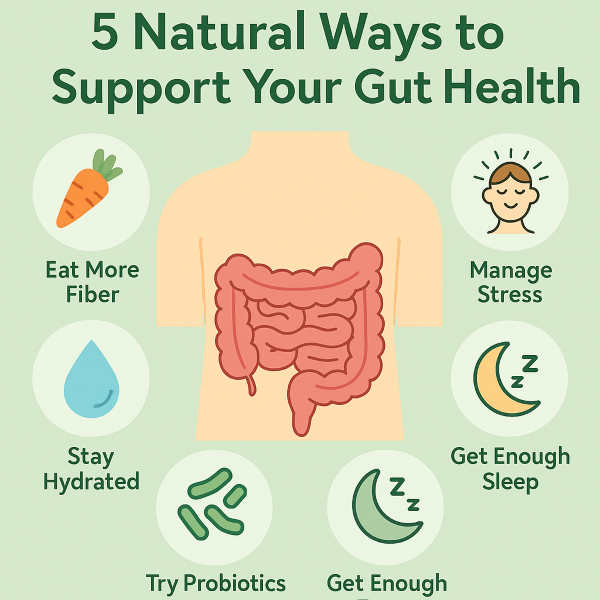Your gut health is key to energy, mood, and immunity. Here’s how to nourish it naturally.

Image created with AI using DALL·E (OpenAI)
Your gut isn’t just a digestion machine—it’s a major player in your immune system, mood regulation, and even your skin clarity.
The balance of bacteria, the strength of the gut lining, and the efficiency of digestion all contribute to overall wellness.
Let’s dive deeper into 5 natural supplements that support gut health, and how to use them properly.
1. Probiotics – The good bacteria you need
Why it matters:
Probiotics help maintain a balanced microbiome, crowding out harmful bacteria and supporting smooth digestion.
Usage tip:
Take probiotics on an empty stomach, ideally in the morning.
Look for products with multiple strains (like Lactobacillus acidophilus, Bifidobacterium bifidum).
Choose enteric-coated capsules for better delivery to the gut.
Caution:
If you’re immunocompromised or taking antibiotics, consult your doctor first.
Some people may experience bloating initially—this usually resolves in a few days.
Food comparison:
Yogurt, kefir, kimchi, sauerkraut, and miso contain natural probiotics, but supplement doses are far more concentrated.
2. Prebiotics – The food for probiotics
Why it matters:
Prebiotics are non-digestible fibers that serve as fuel for probiotics.
They help beneficial bacteria thrive and diversify.
Usage tip:
Add gradually to avoid bloating. Combine with probiotics (synbiotics) for maximum benefit.
Caution:
Too much too quickly may lead to gas or loose stools.
Look for ingredients like inulin, chicory root, or FOS (fructooligosaccharides).
Food comparison:
Bananas, onions, garlic, leeks, asparagus, and oats are rich in natural prebiotics.
3. Magnesium – For smooth bowel movements
Why it matters:
Magnesium relaxes intestinal muscles, promoting regular bowel activity.
Usage tip:
Take magnesium citrate before bed for gentle overnight support.
Start with small doses (200–400 mg).
Caution:
High doses can lead to diarrhea. People with kidney issues should consult a physician.
Food comparison:
Spinach, almonds, black beans, and avocados are excellent sources of dietary magnesium.
4. Aloe Vera – Gentle detox and hydration
Why it matters:
Aloe contains compounds like aloin and emodin that can aid digestion and soften stools.
Usage tip:
Look for “decolorized” or “purified” aloe vera juice to avoid harsh laxative effects.
Start with small amounts and monitor your response.
Caution:
Overuse may cause dependency or electrolyte imbalance. Not recommended during pregnancy.
Food comparison:
Aloe isn’t common in food, so supplementation is usually the only effective route.
5. L-Glutamine – Repairing the gut wall
Why it matters:
L-glutamine fuels cells that line the intestines, aiding in tissue repair and reducing permeability (leaky gut).
Usage tip:
Best taken in powder form on an empty stomach, typically 5g per day.
Athletes or those with IBS may benefit from higher doses—consult a professional.
Caution:
Avoid if you have liver disease or are sensitive to monosodium glutamate (MSG), as glutamine is a precursor.
Food comparison:
Found in beef, eggs, tofu, milk, and cabbage—but only in small amounts compared to supplements.
Final Thoughts
A balanced gut is the foundation of better energy, mood, skin, and immune health.
By using these five supplements thoughtfully—with attention to timing, dosage, and balance—
you’re giving your digestive system the tools it needs to thrive.
Start with one or two that match your current needs,
track how your body responds,
and build from there.
Your gut is not just about digestion—it’s about direction.
답글 남기기